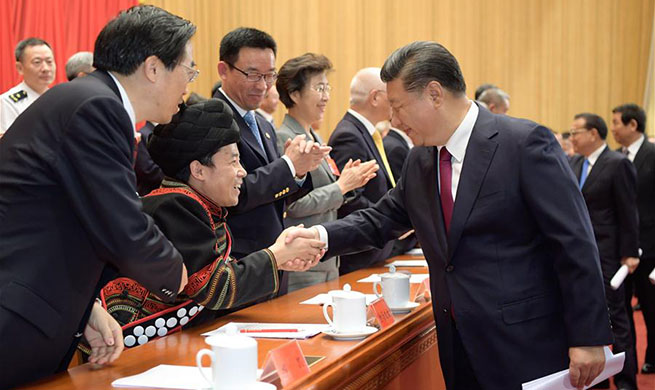BEIRUT, Sept. 14 (Xinhua) -- The Lebanese government should curb its expenditures and increase its revenues in a bid to reduce its public debt, local economists told Xinhua.
One way of reducing government's expenditures is stopping recruitment in the public sector, in addition to doing performance appraisal and firing ineligible employees, said Nassib Ghobril, economist and head of the economic research department at Byblos Bank.
Ghobril said that the government should have done the performance appraisal before approving wages increase for the public sector.
In August 2017, President Michel Aoun signed on wages increase for public sector employees which is estimated to cost some 800 U.S. million dollars annually.
Ghobril said that wages, pensions and benefits for public sector employees accounted for 38 percent of total spending in the 2018 budget.
The government resorted to hiking taxes to finance the increase in wages of public employees.
Meanwhile, the government increased value added tax from 10 to 11 percent, as well as taxes on corporate profits, citizens' bank deposits and tariffs on imported alcohol and tobacco.
Ghobril said that the government thought more revenues will be generated if it increases taxes, which is not the case.
"Revenues in the first four months of 2018 have, in fact, dropped," the economist said.
"Anytime you increase taxes, the activities in the targeted sectors will slow down because prices hike which will have a negative impact on demand," he explained, adding that inflation went up by 7.5 percent in July 2018 compared with the same period last year.
Ghobril said that the best way to improve revenues is fighting tax evasion and improving fees collection including electricity bills and mechanic fees. "We should also work on fighting smuggling across borders," he said.
He also emphasized the need to fully implement anti- smoking and road safety laws which incur heavy penalties on violators, not to forget the protection of intellectual property rights.
"If all these measures are properly implemented, we would be generating additional 1 billion dollars in revenues for the treasury," he said.
Lebanon's public debt reached 82.95 billion dollars at the end of June 2018, up 8.5 percent from 76.5 billion dollars a year ago, according to Byblos Bank's weekly economic publication.
In addition to the need to stop the expansion of the public sector, economist Jassem Ajaka emphasized the need to reform the electricity sector as one way to curb the government's expenditures.
Ajaka cites a report presented by President Aoun during a meeting for the council of ministers, saying that the cumulative deficit in the electricity sector from 1992 to 2017 reached 36 billion dollars, equivalent to 45 percent of the public debt.
Caretaker Finance Minister Ali Hassan Khalil announced previously that the electricity sector costs the state 2 billion dollars every year.
Lebanon has not had a steady power supply since its infrastructure sustained damage during the civil war, while successive governments have failed to agree on a plan to secure electricity supply.
Officials have repeatedly called for the creation of power stations to ensure enough electricity for the country.
However, as the bankrupt national power company is unable to build new power plants, Lebanon has to keep buying electricity from Turkish barges docked off shore.
The current public electricity production in Lebanon stands at 2,000 MW, way below the national demand of more than 3,300 MW in summer months.
Moreover, Ajaka said in one of his researches that a severe problem leading to a further increase in public debt is the cost of debt servicing.
"Lebanon has paid around 66 billion dollars as interests on its public debt from 1998 to 2017 while the monthly average cost of debt servicing increased from 185 million dollars in 1998 to 400 million dollars in 2016," he said.
Moody's Investors Service warned last month that the cost of debt servicing in Lebanon could reach 58.6 percent of the government's revenues by 2021 if the fiscal deficit maintained the same momentum.

















